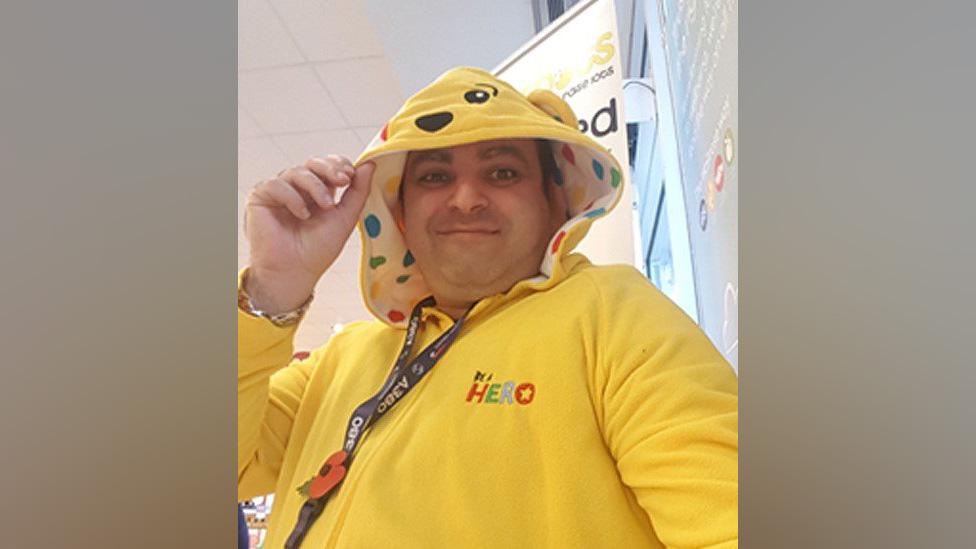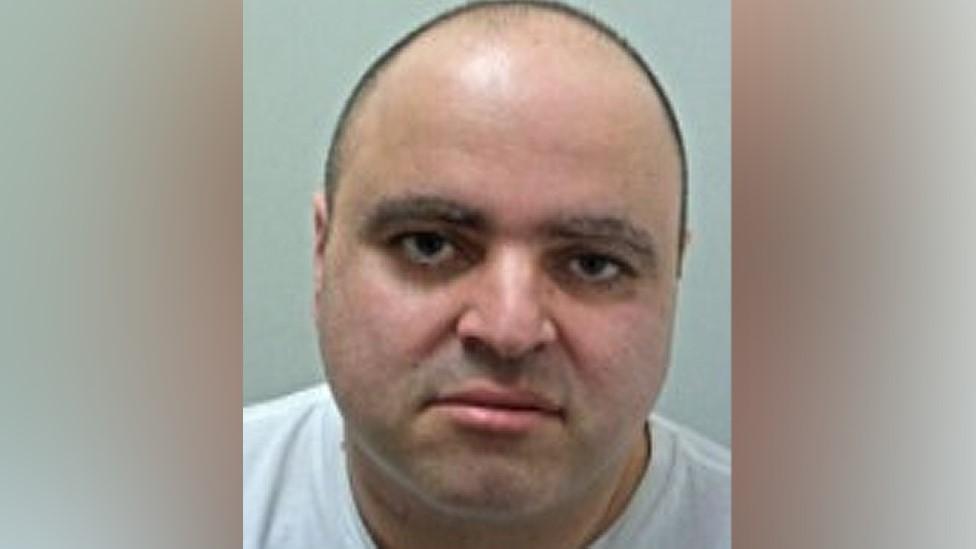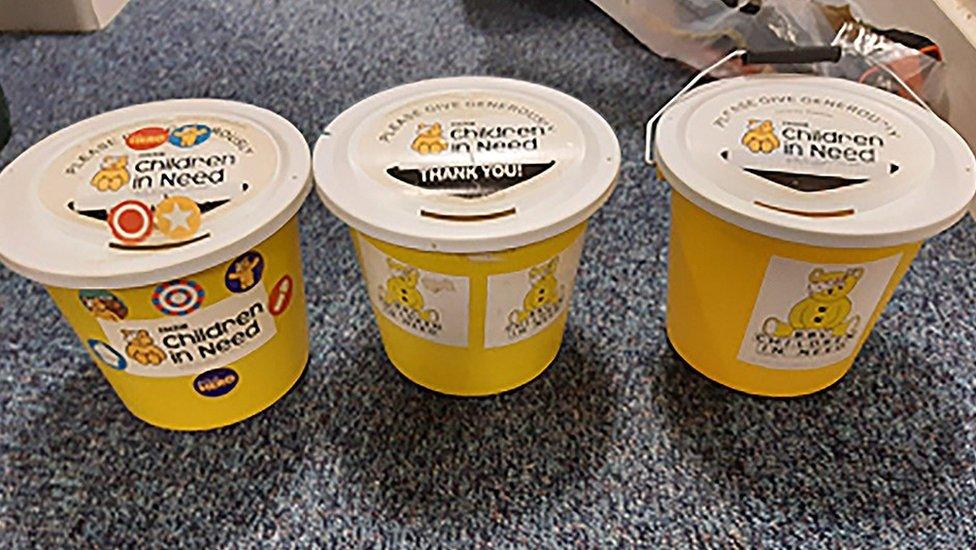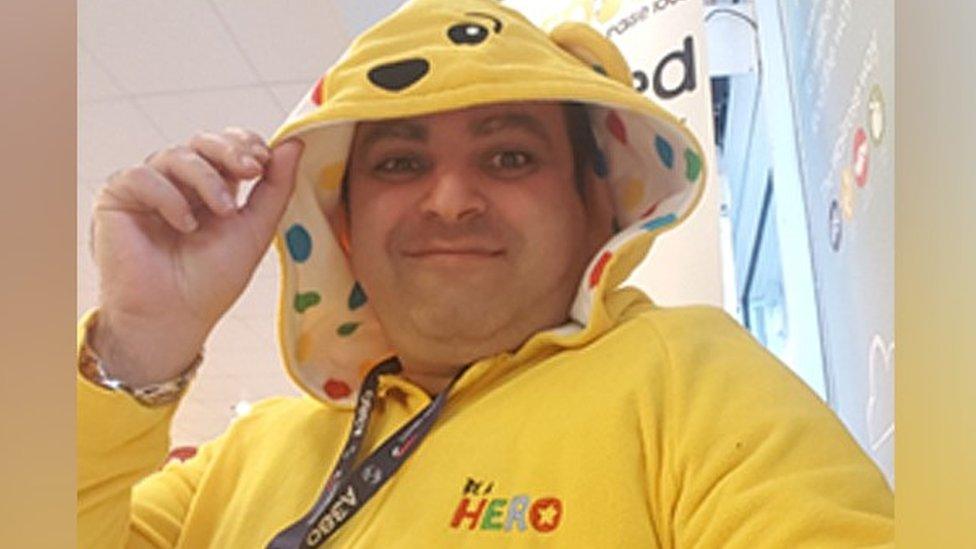Charities urged to check fundraisers' credentials after £500k scam
- Published

The gang wore Pudsey Bear costumes to look like genuine Children in Need collectors
Charities have been told by a regulator to take steps to ensure fundraisers are "open, honest and legal".
The warning comes after a conman who led a gang that stole at least £500,000 from charities including BBC Children in Need and The Christie said he wanted to resume fundraising in the future.
David Levi, from Lancashire, led a group of bogus collectors who pocketed cash they claimed was for good causes.
The 48-year-old even wore a fake Pudsey Bear costume in the decade-long scam.
Police said Levi, who in December was jailed for five years after admitting fraud and money-laundering, enjoyed a "cash-rich" lifestyle, including a luxury holiday and expensive cars.
Six other members of the gang were also given prison sentences.

Pudsey Scammer
How a conman managed to scam more than £500,000 from some of the UK's best-known charities

Gerald Oppenheim, chief executive of the Fundraising Regulator in England, Wales and Northern Ireland, said the scam was a "shocking breach of trust".
While he stressed the "vast majority" of charity fundraising was genuine, he urged charities "to ensure they have robust oversight to ensure fundraising carried out in their name is open, honest and legal".
Levi, of Lytham, said he enjoyed "raising money for good causes" and "fully intends" to fundraise again in the future.
A Serious Crime Prevention Order (SCPO) has been imposed on Levi, which means if he is involved in any fundraising within five years of being released, he could be sent back to prison for up to five years.
Levi, who has previous convictions for fraud and drug smuggling, told BBC North West he wanted to continue fundraising "once my conditions end".

David Levi was previously jailed for running an identity fraud gang in 2005
In an email exchange from prison, Levi denied being a "scammer" and claimed he and his co-defendants were simply taking expenses for "events that we had to pay for upfront".
He claimed those expenses "ran into thousands" of pounds and said all the remaining money had been given to charity.
When the gang was sentenced, however, Preston Crown Court heard that less than 10% of the £500,000 traced through the defendants' bank accounts had made its way to charities.
Judge Andrew Jefferies KC said he could only guess the actual amount stolen by the gang and some cash deposits were made with the charities when police started to investigate.
A BBC Children in Need spokesperson said: "We worked closely with Lancashire Police throughout their investigation.
"During proceedings, David Levi admitted fraud and money laundering and was sentenced accordingly."
Other charities targeted in the scam included Great Ormond Street Hospital, Manchester cancer charity The Christie, The Children's Society and MIND.
There is concern within the charity sector that fraud cases like this, although very rare, could undermine public trust.

Levi's gang used fake merchandise to appear to be genuine collectors for charities
The Blackpool Carers Centre receives regular funding from Children in Need to help pay for respite support for young carers.
In 2016, Children in Need and DIY SOS transformed a neglected Victorian house into a new home for the charity.
Director Alison Brown said Children In Need played a "massive part" in its services for young carers and was worried people who heard about the charity fraud case "may be hesitant" to donate.
"I would say to anyone who's perhaps hesitant now about giving money to charity... it's vital that money still gets donated.
"It does get to the places it needs to be," she added.
Mr Oppenheim agreed the Levi scam was "potentially very damaging".
He said people "shouldn't feel under pressure to give on the spot" when approached, adding: "You can think about it and go back later.
"If you think about it, you can check that the charity is a real one."

Why not follow BBC Manchester on Facebook, external, X, external and Instagram, external? You can also send story ideas to northwest.newsonline@bbc.co.uk, external
Related topics
- Published21 December 2023
